Peter MALONE
Saturday, 18 September 2021 19:49
You and Your Stupid Mate
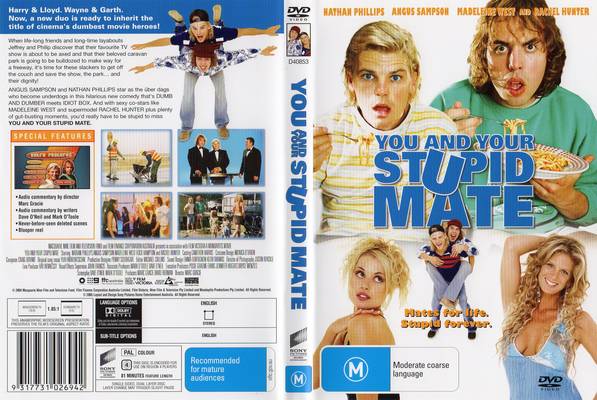
YOU AND YOUR STUPID MATE
Australia, 2005 85 minutes, Colour.
Angus Sampson, Nathan Phillips, Madeleine West, Rock Hampton, Rachel Hunter, William Mc Innes.
Directed by Marc Gracie.
You and Your Stupid Mate is a low-budget popular Australian comedy. On paper, it is one of those popular affairs that makes critics and those who aspire to discrimination cringe badly. However, once the film starts and a few of the slapstick jokes ensue, audiences start to giggle (especially if they are in a group) and this continues right throughout the whole film. Obviously, some audiences will not find it funny. It depends on your funnybone – and probably the film will not travel beyond Australian shores.
The film is a star vehicle for Nathan Philips and Angus Sampson. It is an Australian variation on the Dumb and Dumber theme – and our two nondescript heroes get into all kinds of really stupid scrapes. Nathan Philips, however, made an impact in Sea Change as well as on screen in Wolf Creek and soon appeared with Samuel L. Jackson on Flight 61.
The film was directed by Mark Gracie who wrote, produced and directed for television, including the Full Frontal series as well as some of Jimeoin’s programs. He began directing films in the late 80s with Blowing Hot and Cold and A Kink in the Picasso. He also directed Jigsaw, Crime Time and Takeaway.
1. A genial comedy? Australian Dumb and Dumber?
2. Melbourne settings, the suburbs, the trailer park, Jobs 4 U, the workplaces, the highway, the television filming, the cemetery, the beach, the clubs? Realistic atmosphere for this suburban comedy?
3. The odd couple, the glimpses of them as children, people calling them “you and your stupid mate”, their pranks?
4. Geoff and Philip, their appearance, in themselves, friends, the Australian emphasis, the decorations on the trailer, the inside of the trailer, their lifestyle, spaghetti and baked bean meals? Working in the trailer park – a little? The mother, her five children, her glamour, everybody watching her pass through? Watching Sons and Surf, the impact of soaps, audiences following all the details, no matter how far-fetched? Geoff and his unofficial website?
5. The jobs, their being called in, the interview with Peter, his taking a particular interest, the range of jobs that he got them – and their failures? Collecting the road kill, Mitzi and her death, underneath the sheep, recovered – and appearing later? The rude drawings? The old man and the kerosene in the bath…?
6. Peter, his character, fastidious, his attempts to get them jobs, growing exasperation, his not liking scouts, going to the beach for the finale, his collapse, being given first aid by the scouts?
7. Sons and Surf, the jokes about soap opera, the parodying of the sequences? Emma as heroine? The jokes and the deadpan? The cancellation? The effect on Geoff, his website? The cemetery, meeting the director, the autograph from the star, going to the party, the other star and his swearing at them, yet friendliness? The dancing and Philip being a success, the contrast with Geoff? Knowing that the shoot would be at the beach, the information on the Internet and only two turning up, wanting to rescue Emma, the scouts arriving and the success? The new soap opera, the parallels with Sons and Surf? Life in the trailer park? With Philip and Geoff and their friends? The planned highway not going through? The trailer park becoming the Ned Kelly theme park with all the various personnel involved?
8. Geoff, an oaf, the website, awkwardness with girls, photographed for the television by the helicopter? Awkward, the plan to sabotage the Logies, taking over from Eddie Mc Guire? In jail? Falling out with Philip? His being upset, the party, the plan for rescuing Emma, the Internet, the two fans, the final rescue?
9. Philip, his style, work, scouts, ability at dancing, especially at the party? The rehearsals and the slapstick? His performance as Ned Kelly? Getting the scouts to come to the rescue of Emma?
10. The glamorous girl in the park, five children, her playing her harp in her trailer, dispensing wisdom and encouragement?
11. Emma, nice, her enjoying the rescue? Todd and his being smug? The actor whom everybody imitated – and his irritation? The director and his frustrations?
12. The taxi driver from Somalia, issue of migrants in Australia, nice, his jokes, driving the taxi? The irony of people in Somalia taking time off to watch Sons and Surf? Driving the train in the theme park at the end?
13. A happy ending for all – and more of the same?
14. Verbal humour, visual humour, genial Australian humour?
Published in Movie Reviews
Published in
Movie Reviews
Tagged under
Saturday, 18 September 2021 19:49
Blackthorn
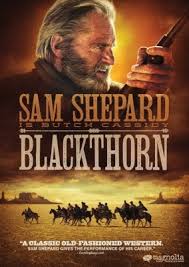
BLACKTHORN
US/Spain/Bolivia, 2013, 103 minutes, Colour.
Sam Shepherd, Eduardo Noriega, Stephen Rea, Nikolai Coster- Waldau.
Directed by Mateo Gil.
Blackthorn is something of a surprise. It is a Western but written and directed by Spaniards. And it is the continuation of the story of Butch Cassidy and his life in Bolivia after the death of the Sundance Kid. a speculation, of course.
Sam Shepherd has a very good role as the older Butch, remembering his past (as seen in flashbacks with Nicholai Coster- Waldau as the younger Butch) living a quiet life, training horses and living with a Bolivian woman. However, he has decided that he wants to end his quiet life and return to America. He sets out but encounters a young Spaniard and rescues him.
The Spaniard is played by Eduardo Noriega, fleeing from pursuers but intent on getting to a mine to recover documents and money. He is helped by Butch and, together, they flee pursuers, through towns, crossing salt deserts, in mountains… However, the Spaniard is not what he seems and has lied to Butch.
Butch arrives in a town where he finds the local consul is the man who pursued him in the past, an official, trapped in a small town and drinking, played by Stephen Rea. He has some satisfaction in finding Butch and eventually helps him to get out of the town.
The film uses many of the conventions of the Western and is in English. Director, Mateo Gil, has written a number of significant screenplays including Open Your Eyes, The Sea Within.
1. A different western? Latin American setting, Bolivia? The early 20th century? The similarity to American westerns?
2. The film in the light of the 19th century? The story of Butch Cassidy and the Sundance Kid? The flashbacks, the life, the robberies, outlaws? The decision to move out of the US and Latin America? The travel and the different States? Etta Place with them? Their activities? The death of Sundance?
3. The film as an international production, writing, directing, cast? The Hispanic flavour? Using Western conventions?
4. The portrait of Butch, 20 years after his alleged to death, his own memories, the new life, working with horses, his work, his relationship with Yana? A quiet retirement? His desire to go back to America, collecting his money, setting out?
5. The development of the Bolivian mines, the role of the families, the companies, intrigue, thieves?
6. Apadaca, his character, his being pursued, audience sympathy, Butch helping him, the mine, his getting back to the mine with Butch’s help, stealing the documents, getting out thoufh the hole, fleeing, the Indians and families in pursuit? Butch rescuing him? Butch losing his money? Apadaca in his debt? telling the truth?
7. The town, the people, the confrontations? Going to the house, the siege of the house, Butch and his shooting, the death of the woman, his grief?
8. The pursuit of Butch and Apadaca, the different terrains, the desert, the salt desert and the crossing? Water?
9. Apadaca and Butch going in different directions, Butch in the town, people recognising him? The possibility of betrayal? The flashbacks to the agent in pursuit of him in the past? Now a consul in the outback town, his satisfaction in catching Butch, the use of frustration and drinking, his not betraying him?
10. Apadaca and the truth, villain, greedy? Butch and his regrets?
11. An interesting addition to the legends about Butch Cassidy, his character, life, the end of the legend?
Published in Movie Reviews
Published in
Movie Reviews
Tagged under
Saturday, 18 September 2021 19:49
Sweet Revenge/ 1998
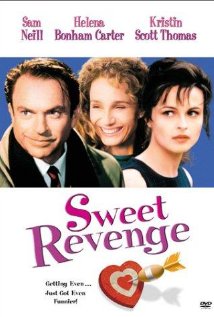
SWEET REVENGE
UK, 1998, 88 minutes, Colour.
Sam Neill, Helena Bonham Carter, Kristin Scott Thomas, Rupert Graves, John Wood, Steve Coogan, Martin Clunes.
Directed by Malcolm Mowbray.
Alan Ayckbourn was one of Britain’s most successful playwrights in the later decades of the 20th century and into the 21st century. He was notable for his wit as well as his irony and satire on British characters in British life.
This is a brief film based on his Revenger’s Comedies. This was used for the original title of the film. However, the film-makers decided to go with a lighter touch with Sweet Revenge.
The film was directed by Malcolm Mowbray who directed a number of comic films and television programs including A Private Function.
The running time is short but quite an amount of plot is packed into it. Opening on Tower Bridge, he shows the attempted suicide of Henry Bell, played with some naivete and innocence by Sam Neill. He is prevented from succeeding with his attempt as he goes to help Karen, Helena Bonham Carter. Her suicide attempt has not succeeded either – and she has gone to the wrong bridge.
Over a drink, Karen suggests a kind of Patricia Highsmith’s Strangers on a Train pact to murder the cause of anguish in each other’s life. Karen is better at this than Henry and she takes on a secretarial job with the man who took over from Henry, played in his style that was to become so familiar by Steve Coogan. Henry, on the other hand, is supposed to murder Imogen, Kristin Scott Thomas, the wife of a local landowner who Karen says slighted her. Instead, Henry and Imogen fall in love and eventually marry, not without an absurd dual between Henry and Imogen’s husband. And all this is presided over by Imogen’s uncle, John Wood, who does the narration in the form of a visit to a church, introducing himself to God formally and explaining why God should help Henry.
1. An amusing comedy, satire, with irony?
2. Alan Ayckbourn’s title, The Revenger’s Comedies? The film’s title and the focus on the sweetness of the revenge? Ironically?
3. Alan Ayckbourn and his plays, theatrical success, the several later adaptations by Alain Resnais? This adaptation from the 1990s? His situations, characters, humour, parody, satire? The theatrical nature of the film, the opening out from the theatre?
4. Colonel Marcus and his narrative, going to the church, the formal introduction to God and thanking him for his time in listening? His story of Henry Bell? The flashbacks? His narrative continuing during the film, sometimes to camera? The end and his comments? A very Brit character?
5. Henry and his situation, on the bridge, losing his job, the divorce, his papers falling into the river? Hearing Karen’s plea, the rescue? Listening to her story – her hyper story? The wrong bridge? Going to the cafe, the reactions to the men? The blunt style? Taking Henry home?
6. Karen, the situation, her exaggeration, the wealth, the house, Winnie, old, dominating the trainee and wanting to stay? The night, sexual relationship, Henry’s clothes gone, carried out? Eccentricities? Driving, her car? Oliver and his explanations?
7. The pact, the overtones of Strangers on a Train? How serious her intent? Drawing Henry into her plans?
8. Oliver, the younger brother, his character, the story of their childhood, the burnt house, their parents’ death? His bike, riding through the house? A pleasant playboy? His friendship with Henry?
9. Tony, his story, type, the hunt, despising his wife, not having a relationship with Karen despite her story, his actual liaison with the trainee’s mother, and the woman and her finding out the true story and her over-reaction? An unlikely liaison?
10. Imogen, haughty at first, encountering Henry, the injury, his carrying her, falling in love, the husband catching them several times, his anger?
11. Solving the problem with a dual? Marcus, his bringing the message? The explanations of the rules? The duals in the 20th century? Oliver training and helping Henry, assisting him? Tony and his assistant? The set up, Henry’s reaction, ducking, his gun going off, Tony accidentally shot, his death and lament that he was dying from an accident? Marcus and his being content with the result, for Henry and Imogen to marry?
12. Karen as secretary, her frizzy hair, the arrival of Bruce, as a personality, his touching her and her reactions? Work in the office? The importance of the inhaler? Karen and the phone calls to Bruce’s wife, her voice, with the radio, finally appearing at the car and her dress? The wife’s reaction? Bruce and his reaction? In the office, the inhaler, Karen pretending not to find it? His death? Henry and his shocked reaction?
13. The happy ending to Henry and Imogen?
14. An amusing comedy, British perspectives?
Published in Movie Reviews
Published in
Movie Reviews
Tagged under
Saturday, 18 September 2021 19:49
Dallas Buyers Club
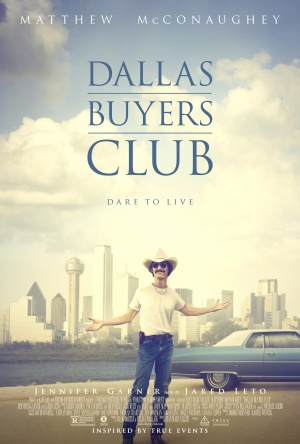
DALLAS BUYERS CLUB
US, 2013, 120 minutes, Colour.
Matthew Mc Conaughey, Jared Leto, Jennifer Garner, Dennis O’ Hare, Steve Zahn, Dallas Roberts, Griffin Dunne.
Directed by Jean- Marc Vallee.
Dallas Buyers Club made quite an impact on its release at the end of 2013. It was nominated for a number of Oscars, including best film and won acting awards for Matthew Mc Conaughey as best actor and Jared Leto as best supporting actor.
This is an interesting experience rather than an enjoyable film. It takes its audience back into the 1980s, to the time of the emergence of AIDS, with puzzlement about the emergence of the illness, its origins, its causes, its communication, the prevalence among gay men, the acquiring of the disease through unprotected sex with men and women, the communication of the disease by shared needles. With the subsequent 30 years of history and the changes in treatment for AIDS, its prevalence throughout the world, the removal of much of the social stigma of the 1980s and 1990s, it is important to do some kind of examination of the situation, some kind of examination of conscience, about reactions and behaviour in those decades. It is also important to look at the developments and abuses of drugs taken to combat the virus.
We are introduced to Ron Woodruff, an electrician in Texas, a participant in rodeos (with sexual behaviour behind the barriers), a kind of self-important man-about-town, leading a carefree and somewhat dissolute life, especially as regards sexual behaviour, alcohol and drugs. When he is injured through an electrical fault, he finds himself not only in hospital but with serious doctors telling him that he has only 30 days to live, that he was infected with the AIDS virus. He reacts violently, in denial.
He does go back to hospital where he encounters a transvestite in the ward, Rayon (Jared Leto), also with AIDS from his life on the street. Ron reacts to him with homophobic outbursts – which he then experiences from his co-workers, suspicious of his behaviour.
With the help of a worker at the hospital, he finds a doctor in Mexico who is able to supply him with AZT which improves his health. However, eventual research indicates that AZT is injurious to the immune system and Ron makes further investigations about the availability of drugs, many of which are prohibited by the FDA in the United States. He starts to import from Mexico and from other countries, impersonating a priest to get them through the border, but not being effective and immediately coming under suspicion.
To continue to help people who line up at his motel door, he decides to form a club asking financial membership which enables the members to get the drugs. He is helped by Rayon and the two gradually form a strong friendship, Ron overcoming a lot of his prejudices as he deals with actual people rather than gossip and hearsay.
The film continues with interventions from the FDA officials, court cases, his improving health and Rayon’s deteriorating health. All through he has been helped by a sympathetic doctor from the hospital, played by Jennifer Garner.
Ron Woodruff eventually lived another seven years, and during those years the US government had to consider further medication to combat AIDS and the safety and health of those involved in trials as well as the many – which we know from history was numerous – who were to die from AIDS.
While Matthew Mc Conaughey is jauntily comic at times, and Jared Leto gives a moving performance, the film is not so much popular entertainment, but a film which engages the mind as well as the heart and urges us to look back over history in order to learn from it.
1. A perspective on history? Medical history? Social illness? Moral concerns?
2. The number of awards and their merit?
3. The title, Ron Woodruff, from Texas, his story, the issue of drugs for HIV, his club and membership? Helping HIV patients to some better health?
4. The framework, the rendezvous, the sex during the rides, unprotected sex, disease? Ron and his bets? The chase? The end, the ride, staying on and surviving?
5. Ron Woodruff, Matthew Mc Conaughey’s performance, Oscar? The introduction to him, at the rodeo, his lifestyle, sexual partners, betting, losing, his being pursued, the police helping him out and delivering him home? The angry pursuers? His work, electrician, the trapped man, the electric charge and his being knocked out, waking in hospital, the doctors and their presence, explaining his situation to him, his angry response, 30 days to live?
6. The diagnosis, the tests, his reaction, swearing, the numbering of the days for his life – and going beyond the 30? By 1992 at the time of his death, well
beyond the 30 days?
7. His way of life, single, bravado, dissolute, sex – and his not going to Saudi Arabia for work because of its social and sexual mores? His friends, their partners, his looking at the calendar?
8. Going back to the doctors, their diagnoses, advice? The issue of drugs, the FDA? The officials? AZT, the trials, the meetings of the companies and doctors, the placebos and the drug? Ron wanting to go on the trial?
9. His friends, their suspicions about his sexual behaviour, the homophobic reactions, which he also shared about others? The fights with his friends, being refused to go on site? His home, locked out? His collapse?
10. The hospital, in the ward, Rayon and his sharing the ward, Ron’s reaction, abusive language? Rayon, playing cards? Ron and his leaving, Eve and her calling him back?
11. The principal doctor, working with the companies, the rules, on the wards? The contrast with Eve, the interviews with her, his personal interest? The facts of the case, her empathy? Ron inviting her to a meal, the gift of his mother’s painting, his stealing her pad and using it for prescriptions? Her reaction? His challenges to her about the rules and interpretation? Her supporting him?
12. The sequences in Mexico? Information about drugs? AZT? Its dangers for the immune system? The information about other countries including Israel? The importation of the drugs, the disguise as the priest – and its failure?
13. The Club, the range of members, signing in, their lining up at the motel, the young man who could not afford the drugs? and the effect?
14. Rayon, his work, the growing bond with Ron, eventually the embrace, going to his father, seeing his background, the request for finance? His final
illness, his death?
15. The variety of helpers, the work done, advice about the law? Explanations of what was happening?
16. The inspectors, their interrogations? Ron and his importing the drugs, the role of the law?
17. His decision to sue, the help of the lawyers, the sequences in court, the hearings, the FDA officers, witnesses and the officials, the judge sympathetic to Ron, but having to rule against him?
18. The final importing of the drugs, using Eve’s documents?
19. Ron himself, living another seven years, the final rodeo ride, symbol of his clinging to life despite the bumps?
20. The importance of this kind of film for taking audiences into the history of AIDS, of drugs, and seen in the light of subsequent developments and control of HIV?
Published in Movie Reviews
Published in
Movie Reviews
Tagged under
Saturday, 18 September 2021 19:49
Annie Get Your Gun
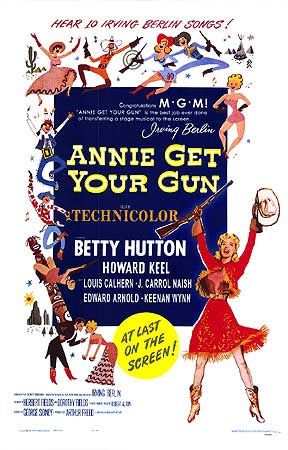
ANNIE GET YOUR GUN
US, 1950, 106 minutes, Colour.
Betty Hutton, Howard Keel, Louis Calhern, Keenan Wynn, Edward Arnold, J.Carol Naish, Clinton Sundberg.
Directed by George Sidney.
Annie Get Your Gun was one of the most celebrated of the post-war Broadway musicals. It was a star vehicle for Ethel Merman. And it had a fine collection of songs, music and lyrics by Irving Berlin (Call Me Madam, Blue Skies) with the perennial showstopper, There’s No Business like Show Business.
The story is that of Annie Oakley, the famous sharp shooter, portrayed by Barbara Stanwyck in the 1930s biography, Annie Oakley. However, in this version, she comes from the backwoods, wins the shooting competition over the celebrated Frank Butler, is invited to become part of Buffalo Bill’s Travelling Show, scrubs up very nicely and becomes a star attraction to Frank Butler’s annoyance. She travels to Europe with the Show and plays to the royal heads of Europe, including a scene in this film with Queen Victoria. However, she still hankers for Frank Butler and returns home. Buffalo Bill is in debt as is his rival showman, Pawnee Bill (Louis Calhern and Edward Arnold). A merger is proposed but Annie and Frank create difficulties, but Annie is advised to back down and lets Frank Butler win a competition and then she gets her man.
While Howard Keel had appeared in some small dramas before this, Annie Get Your Gun was really his introduction, his first musical, and he was an MGM star from 1950 to 1956 when the musicals stopped. As with other contract players, he also appeared in a number of dramas in comedies.
This is really Betty Hutton’s show, when she eagerly took over when Judy Garland became unwell and had to withdraw. In That’s Entertainment, audiences can see Judy Garland performing I’m an Indian Too.
The musical has continued to be popular on stage right into the 21st century with quite a number of actresses doing their turn as Annie Oakley, particularly notable being Bernadette Peters.
The director of the film is George Sidney, veteran of many musicals including The Harvey Girls, Showboat, Jupiter’s Darling.
The excellent songs are, in order of their appearance: (though not all the songs from the stage were used)
Colonel Buffalo Bill
Doin’ a what comes natcherly
The Girl that I Marry
You cain’t get a man with a gun
There’s No Business like Show Business
Falling in Love is Wonderful
My Defences are Down
I’m and Indian Too
The sun in the morning and the moon at night
Anything you can do, I can do better…
1. The stage history of the musical? Ethel Merman and her raucous tradition? The film as a vehicle for Judy Garland? Her withdrawing? Betty Hutton taking over and making the role her own? Later stage versions and continued popularity?
2. Irving Berlin, the strength of his melodies, the strength of his lyrics – straightforward and conversational? Their placement during the film? Contributing to plot and character?
3. The style of MGM musicals in the 1940s and the 1950s? Casts, directors, staging of the songs, costumes and decor, bright and popular?
4. Annie Oakley and the legends? The true story? As a markswoman? The films about her? This version, grubby, from the backwoods, with the kids, selling the quails, her skill at shooting? The hotel manager, arranging for her to compete? Her seeing Frank Butler – and the exaggerated jaw-drop? Winning the competition? Frank Butler’s sour reaction? Her being invited to join Buffalo Bill’s Show? The travel, the kids unlocking the carriage, her scrubbing up well, in supporting roles, the plan of Charlie and Buffalo Bill, the poster and her being happy, Frank Butler not being happy? The surprise of her performance on horseback, Frank’s turning her down? The success, European trip, with Queen Victoria, all the medals, returning home? Kissing Frank, the rivalry with ‘anything you can do…’. Spoiling the potential merger between Buffalo Bill and Pawnee Bill? Her being persuaded to lose against Frank? But getting him to the altar? The background of the Indians, Sitting Bull and the ritual of making her his daughter?
5. Frank Butler, vain, a good marksman, meeting Annie, in love, but a bad loser, his irritation at her poster, at her performance? Joining Pawnee Bill? Reunited to the end, after the rivalry and Annie losing to him?
6. The popularity of the travelling shows, the big audiences, all over the US, to Europe, the crowned heads, the medals and awards? Queen Victoria?
7. The presence of the Indians - looking at these sequences in retrospect, segregation, in the car, the comments on their manners, lining up for food…?
8. Sitting Bull, his liking Annie, organising the ritual for her to become his daughter? His investing in the combined show?
9. Charlie, tough, managing, critical of Frank, supporting Annie, his work with Buffalo Bill?
10. The spectacle, costumes and decor, the lavish show, the action?
11. The happy ending?
12. Popular in the 1950s – and still going?
Published in Movie Reviews
Published in
Movie Reviews
Tagged under
Saturday, 18 September 2021 19:49
I, Frankenstein
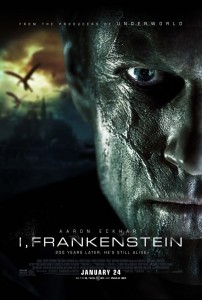
I, FRANKENSTEIN
Australia, 2013, 91 minutes, Colour.
Aaron Eckhart, Bill Nighy, Yvonne Strahowski, Miranda Otto, Jai Courtney, Bruce Spence, Nicolas Bell, Aden Young.
Directed by Stuart Beattie.
In the final credits of this reworking of the Frankenstein Monster story, there is a thanks to Mary Shelley. It is not certain that Mary Shelley would appreciate this expression of gratitude because, while the film does use some of the elements of her classic story, it moves into the 21st century and futuristic science-fantasy.
Aaron Eckhart is, perhaps, the best looking of the cinema Frankenstein Monsters. He says he was made from eight different corpses, and he looks remarkably integrated with a very limited number of scars, especially on his face. He is an intense Monster, speaking out his animosity towards his maker, revenging himself by killing Frankenstein’s wife, Elizabeth, with the scientist pursuing the Monster to the north, eventually freezing to death and being buried by the Monster, while finding his manuscript detailing his experiments.
Attacked by a range of Demons, the Monster finds himself in the 21st century – filmed in Melbourne, utilising some of its landmarks, a tram and tram stop at the top of Bourke Street or Collins Street, a notice, Central Station, on the Arts Centre, something that the locals have found amusing but which other audiences will not notice. It is a strange city, full of decaying edifices, cathedrals and Gothic buildings for the race of Gargoyles, and then suddenly seeing some modern cars and rubbish skips in the streets. Since it is all based on a graphic novel, these imaginings we have to accept.
While the story is serious, there are touches of the absurd, even of the ludicrous, in some of the dialogue and performances. Yvonne Strahowski is the human scientist, along with Nicolas Bell, working on a re-animation program at the behest of alleged entrepreneur, Wessex, who is really the arch Demon, Naberius. He Is played in familiar manner by Bill Nighy, indicating moods and attitudes simply by raising an eyebrow or giving a sideways glance. Also in the cast is Miranda Otto as the Queen of the Gargoyles and Jai Courtney as her henchman.
The colour is dark, the city is sinister, the laboratories modern. There is a reliance on special effects, especially for the explosions of the Demons and the battles with the Gargoyles.
Written and directed by cinematographer, Stuart Beattie, who directed Tomorrow When the War Began.
A variation on the theme, but certainly not the last word or image on the Frankenstein myth legend.
1. An interesting Frankenstein story? Credit thanks to Mary Shelley? But, rather the 21st century graphic novel? The use of the past story, bringing it into the present, perspectives for the future?
2. The use of the old story, the Monster’s experience, enmity towards Frankenstein, the murder of Elizabeth, Frankenstein’s pursuit of the Monster to the north, dying in the cold, the Monster burying him, the book?
3. For the future, the Demons, using the Frankenstein experiments to reanimate an army, the Gargoyles, the destruction of the human race?
4. The visual style, 3-D, the dark city, the buildings, the streets, atmosphere of decay – yet streets with some cars and rubbish skips? The ruins? The interiors? The contrast with the tram and the people, the lights at Central Station? Melbourne of the imagination? Design? Photography? Stunts, effects? The musical score?
5. The audience response to the Monster, Aaron Eckhart and his appearance, not so grim as traditional Monsters? His vengeance?
6. The attack of the Demons, their being destroyed in fire, the Gargoyles, their flying, all taking human form? The capture of the Monster?
7. The Gargoyles, the Queen, her reliance on Gideon? Her abode, the trappings of royalty? Gideon wanting to kill the Monster? The Queen giving him the name, Adam? Supporting him? Wary? The Gargoyles and their own scientist watching the Demons and their experiments?
8. Wessex, modern dress, suits and ties? The laboratories? Terra and Carl, their work, the range of Demons in attendance, all in suits? The Demons using humans?
9. Adam, the confrontation with Wessex, Terra, the importance of the book, the description of the experiments? The Monster’s escape?
10. Terra and her lodgings, squalid, sewing his wounds? The attack of the Demons?
11. The plans, Terra and her warning Carl, Central Station, being captured? Carl being killed and the experiment of re-animation?
12. The confrontation between Adam and Gideon, the fight, Gideon destroyed?
13. The racks of bodies, ready for reanimation? The Gargoyles scientist and his monitoring the situation? Terra and her working on the re-animation?
14. Terra reading the book, the Monster reading the book, destroying it?
15. The return to the Gargoyles? The Gargoyles flying and fighting the Demons?
16. The confrontation with Wessex, his demonic presence, his ambitions, to rule the world, death?
17. The final battles, destruction? With the Monster on the roof, looking to the future, the son of his father, I, Frankenstein?
Published in Movie Reviews
Published in
Movie Reviews
Tagged under
Saturday, 18 September 2021 19:49
Stolen/ 2012
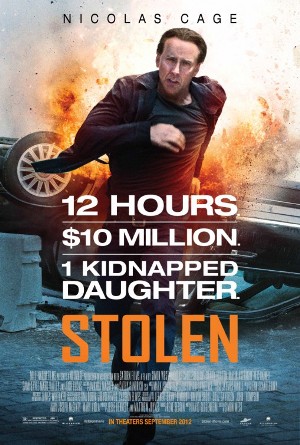
STOLEN
US, 2012, 96 minutes, Colour.
Nicolas Cage, Josh Lucas, Malin Ackerman, Danny Houston, Sami Gayle.
Directed by Simon West.
Stolen is one of the many routine thrillers that Nicolas Cage made, sometimes several a year, in his later years. It is the story of a thief, whom we see an action with his associates, robbing a bank of $10 million. In contrast to his associate, Vince (Josh Lucas), he is sympathetic to a guard who was shot and goes back to him, eventually being caught. He spends eight years in prison.
The rest of the film takes place on the day that he gets out. He goes to visit his daughter who is less than enthusiastic to see him. He goes to see one of his team who works at a bar (Malin Ackerman) as well as the detective who pursued him in the past (Danny Huston).
Then his daughter is abducted by Vince who is completely embittered, especially with his artificial limb caused by a shot from Cage. He is a cabdriver, and Cage uses his wits to track him down as do the police to pursue them both. And all ends happily, Cage recovering his daughter from a burning car which is driven into the river to save her, but a touch of ambiguity as to whether he has thrown some gold bullion away.
The film was directed by Simon West, a specialist in action films including Con Air, The General’s Daughter, The Mechanic, The Expendables 2.
1. A routine action adventure? Nicolas Cage adventure? Robberies, prison, abductions, pursuits?
2. The New Orleans setting, the streets, the banks, the Mardi Gras procession? The musical score?
3. The initial robbery, the group, their tactics, the police in surveillance, the information, the wrong street, the wrong bank? The group getting inside, the tools, the safe and opening it, taking the 10 million, seeing the gold? The escape, the police pursuit, the shooting of the old man, Will and his returning, Vince upset, being shot in the leg, the vehicle escaping? Will being caught, burning the money?
4. His eight years in jail, trying to keep contact with his daughter? His release?
5. Harland and his role with the police, the force, the surveillance, the mistake, the pursuit of Will?
6. Will and his going to see Riley, her friendship and support?
7. His seeing Harland, the bond between them? The burning of the money? The suspicious detective? Keeping surveillance on Will?
8. Will and his daughter, the discussions, the tentative relationship, her becoming older, his toy gift for her? Her going to see her psychologist? The taxi, Vince picking her up? His putting her in the boot? Her crying out for help? the policeman stopping the taxi, suspicions, the taillight? The phone calls to Will?
9. Will, his concern, the pursuit of Vince, talking to him on the phone, the discovery that he was not dead, Vince and his explanation about digging up a corpse and dismembering it, his vanishing? Taxi driver for two years? Will in the taxi, the phone call to the organiser, getting the information, the pursuit? The false taxi number? The Mardi Gras procession?
10. The police, suspicions, working out what was happening, pursuit?
11. Vince, wanting the money, Will promising it? His idea, the gold in the bank, getting Riley to help, the tools, going to the bank, the melting of the gold, collecting it, the police working out where he was? The escape? The fast driving, bringing the gold to Vince?
12. The confrontation, Will being shot in the leg, his daughter in the car, the fire, driving the car into the river, putting out the fire, rescuing his daughter?
13. Saving some of the gold, the police watching him, whether he would throw the gold into the river or not, his seeming to – but yet keeping some of it?
Published in Movie Reviews
Published in
Movie Reviews
Tagged under
Saturday, 18 September 2021 19:49
Breakout/ 2013
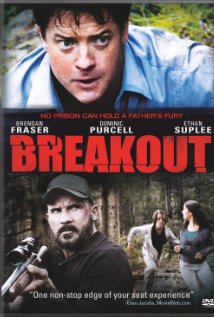
BREAKOUT
US, 2013, 89 minutes, Colour.
Brendan Fraser, Dominic Purcell, Ethan Suplee.
Directed by Damian Lee.
Breakout was produced by its star, Brendan Fraser. He features as an environmentalist, neglecting his family in his protests, involved in a fight with a logger which results in the death of the logger and the hero going to prison. Years pass, his wife, who is his lawyer, leaves him and his now teenage daughter to whom he was devoted has her own problems.
In the meantime, two brothers one who has been in prison, the other in a mental institution, drive north to make a new life for themselves. They are played by Dominic Purcell and Ethan Suplee, the latter playing the mentally handicapped man. At the same time, a friend of the hero takes the two children camping and are present when the ex-prisoner shoots the man who is renting him the house. The rest of the film is a pursuit in the woods.
The film does not really go anywhere with the environmentalist process and protest, the company having a change of heart over many years and offering the hero a job in advising them. He is to be released from prison. The film then focuses on his breakout and his relationship with his children and the hunt.
1. The blend of environmental themes, family themes, chase thriller in the wilderness?
2. The forest settings, for logging and protests? For camping and holidays? For dangerous pursuit?
3. The title, appropriate, to Jack’s behaviour? His motivation?
4. The environmental themes: Jack, his protests, the groups, the businessman, the challenges? The fight, the man falling and hitting his head on a stone?
5. Jack in prison, writing to his daughter, the years passing? His work in the forest as a prisoner? His attempts to make contact with his family?
6. His wife, estranged, but his lawyer? The proposal that he worked for the company? Their alleged change of heart? His considering it? Accepting it?
7. The story with Tom and Kenny, Tom in prison, Kenny in an institution, the accident? His devotion to their mother? Tom severity in judging their mother? The driving north, going to Canada, the house, settling in, fishing? Fiona, the owner, the clash of interests, Tom and his brutality, the man and his fears, is being shot?
8. The family, Chuck and his helping with the children, and the going to the river, fishing, the kayaks, hearing the shot? The confrontation, the brutality towards Chuck, is urging the children to run, his being killed by Kenny? The children and their fears, hiding in the tree, eluding Tom?
9. Jack, his wife ringing him, the news, escaping from the work force, trying to find the children, Tom firing at him? The children, on the kayak, the shot and the leak, their being in the water? The further pursuits?
10. Kenny, the phone, thinking it was his mother, talking to the mother, her concern, finding Alison, the different aspects of the pursuit, Kenny and his concern, the fight with Chuck and his death?
11. The shootings, the final confrontations, Jack and his recovery, Tom’s death?
12. Bonding experience for Jack with his children?
Published in Movie Reviews
Published in
Movie Reviews
Tagged under
Saturday, 18 September 2021 19:49
I Want Candy

I WANT CANDY
UK, 2007, 87 minutes, Colour.
Tom Riley, Tom Burke, Carmen Electra, Eddia Marsan, Mackenzie Crook, Philip Jackson, John Standing, Michelle Ryan, Jimmy Carr.
Directed by Steven Surjik.
A lightly lewd jokey British comedy about film students, desperate to make a movie, who get tangled up with some gangsters and porn film-makers. You can guess the rest and you would be generally right: lots of mix-ups, filming in the family home, criminal threats, hopes for a career and their being dashed, culminating in a happy ending and the equivalent of the Oscars for the porn industry.
It would be silly to take this one too seriously – it doesn’t take itself very seriously although the cast work earnestly and with energy. There are some crass moments but nothing like scenes in the early Scary Movies and the sex scenes are brief and mild, less explicit than in the British comedies of the 1970s in the Confessions of a… series.
It has the Ealing Studios logo which could mean that some veterans of the heyday of the 1950s might be turning in their graves!
1. The blend of the comic and the serious? Students? The film industry? Pornography? Produces and gangsters? University courses in filmmaking?
2. The title, Candy, her reputation, Candy Fiveways, porn actress, the real character, performance, sex?
3. Joe and Baggy, their homes, parents, study, hopes, the first film and its failure, the film course, short films, lack of resources, the lecturer and his attitude?
4. Their characters, their friends, parents, girlfriends?
5. The idea, money, Doug, De Vere, the spiel? Mistaking the nature of the production company? The sex films, the posters, manners? The promise?
6. The money issues, resolved by Doug and DeVere? Contracts? Expectations about Candy?
7. The making of the film, enlisting the aid of the fellow students, the agreements, the cache, motivation, sex?
8. The sex scenes, at an MA a level? Suggestive? Less explicit? The Carry On style?
9. Candy, reputation, the meeting, refusing, and agreeing, coming to the home, the filming, with the boys?
10. Doug and De Vere, being tricked, the dangers?
11. The parents, the innocence and naivete, the filming? Seeing the film?
12. The University, the film course, the lectures, arty comments? The lecturer, his character? Being impersonated, tricked? Visiting the parents? Discovering the truth?
13. The visit to the video store and the advice of the man behind the counter?
14. Doug pretending to be the lecturer, his spiel to the parents?
15. The satire in the presentation of the awards, the screening, the people present, success?
16. Tongue-in-cheek parody?
Published in Movie Reviews
Published in
Movie Reviews
Tagged under
Saturday, 18 September 2021 19:49
Apres Mai/ After May
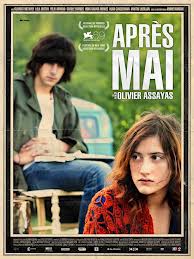
AFTER MAY/ APRES MAI
France, 2013, 106 minutes, Colour.
Clement Matayer, Lola Creton, Felix Armand, Carole Combes, India Menuez.
Directed by Olivier Assayas.
The May of the title is that of May 1968, the month of the student demonstrations and protests at the Sorbonne, Paris. It was a moment of truth in French society and politics, signalling change. This story takes place some years later, focusing on a young man in high school, listening to a philosophical paragraph from Blaise Pascal, the teacher urging his students to think about their situation.
The potential for interest in this kind of story is quite strong and has been treated in a number of films, especially Bernardo Bertolucci’s The Dreamers. However, while many audiences may be caught up in this story and its characters, many will not. This review is amongst those who were not.
The focus of the story is a pasty-faced, gaunt, long-haired young man who is committed to protests, demonstrating and running the risk of being injured by police brutality, is into painting graffiti on the walls of his high school, likes having abstract discussions about social issues and affiliations with groups like the Trotskyites. He also aspires to be an artist. And he moves with a group of like-minded young people, rather interchangeable with each other, rather than standing out as interesting and distinguishable characters. There is a young woman with whom the young man has an affair, but she moved to London. There is a fellow artist who is infatuated with an American woman in Paris. Then there is another young activist woman who could be in love with the young man, but…
After experiencing some difficulties and threats, some of the group go off to Italy but the young man is dissatisfied there and comes back to France where he is involved, partly-involved, continuing with his art, falling in and out of love, wanting to make films. He finally get his chance to be involved in England when he works at Pinewood Studios in one of those prehistoric kind of films like The People that Time Forgot, but this one has a mixture of dinosaurs and Nazis and a submarine. And there we leave him except that he seems to stand in for the character of the writer-director, Olivier Assayas, who has made a number of very interesting films, but not this one. A film for specialists of the period and those who enjoy French films which are a mixture of the morose and the abstract.
1. The director and the range of his career? This film as a memoir? the effect of his early searching on his career?
2. The title, May 1968, Paris, the riots? The role of the students? Ideas, philosophical background, revolution? The critique of the status quo? 20 years after World War II?
3. The settings: Paris, France, Italy? The 1970s? Realism?
4. The central character, class, philosophy, writing? His place in the group? Discussions? The influence of 1968? Into the 1970s?
5. The range of characters, the relationships, age, study, sexual liaisons, international, including the United States?
6. The girl, the hero, their on and off relationship?
7. Dangers, going to Italy, the Italian experience and the effect?
8. The return, times changing, moving in age, relationships, meeting the girl again?
9. His going to the United Kingdom, working in film, the creature-feature? The nature of his work?
10. The director looking back at the influences on his life?
Published in Movie Reviews
Published in
Movie Reviews
Tagged under